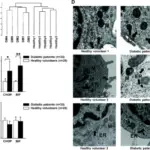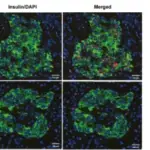Diabetes Mellitus Type 1 is a metabolic disorder that is characterized by a complete deficit of insulin triggered by pancreatic β-cell destruction.
What is the Pathology of Diabetes Mellitus Type 1?
The pathology of diabetes mellitus type 1 is:
-Etiology: The cause of diabetes mellitus type 1 is autoimmune β Cell Destruction, genetic susceptibility, environmental factors.
-Genes involved: None.
-Pathogenesis: The sequence of events that lead to diabetes mellitus type 1; the chronic autoimmune attack on β cells by T lymphocytes, autoantibodies against islet cells, and locally produced cytokines. Progressive obliteration of β cells results in clinical Diabetes. Also linked to genetic susceptibility mapped to at least 20 loci. However, the specific genes involved are not known.
-Morphology: Thin.
-Histology: None relevent.
How does Diabetes Mellitus Type 1 Present?
Patients with Diabetes mellitus type 1 typically present at an age range of 15 years. The symptoms, features, and clinical findings of Diabetes mellitus type 1 include polydipsia, polyuria, lethargy, dehydration, acidosis, and weight loss.
How is Diabetes Mellitus Type 1 Diagnosed?
Diabetes mellitus type 1 is diagnosed through clinical presentation and laboratory studies such as blood glucose elevated.
How is Diabetes Mellitus Type 1 Treated?
Diabetes mellitus type 1 is treated through insulin delivery by multiple daily injections or insulin pumps. Dietary consultation may also be needed.
What is the Prognosis of Diabetes Mellitus Type 1?
The prognosis of diabetes mellitus type 1 is fair has high morbidity and mortality and a reduced life expectancy by 10-20 years.



